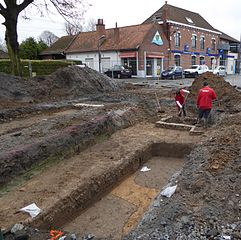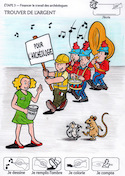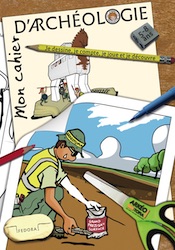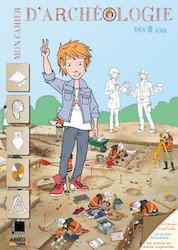How to Fund Archaeological Missions
- Last Updated: Tuesday, 28 June 2022 09:41
- Published: Tuesday, 01 March 2022 15:53
- Written by Jean-Olivier Gransard-Desmond translated by Marine Quesnel and Leah Gallet
- Hits: 2091
Join Augustin, Alex, Lisa and the whole ArkeoTopia team to discover additional resources for step 3 in My Archaeology Book about how to seek funding for archaeological research.
Step 3 – Seeking Funding for Archaeological Research
Corresponding pages in MAB1 and MAB2
MAB 1, p. 13 (step 2, p. 7 in the 1st edition) and MAB 2, pp. 16-17
More about this step’s reference artifact
The drawing in My Archaeology Book titled Fundraising shows a parade of supporters campaigning for archaeological research. Whether conducted by professionals or volunteers, fund seeking is a necessary part of what makes archaeological research possible.
Even if one has their own funds, it is important to understand that not everyone can launch an archaeological research program. Depending on the country, a degree and/or license is required. In order to launch an archaeological research program one must have either field experience that is recognized by peers or a PhD in archaeology, as well as the necessary on-site permits to do the work. Check out the State of Washington's permit requirements in the US, for example. Once a permit has been acquired, one still needs to find the money to fund the field research program.
Here’s an example to demonstrate the costs related to an archaeological research program and the potential for funding. Proving that there were at one time humans present on-site at an excavation takes time and cannot be done in a matter of days. Time and a trained staff are needed, but skilled workers are expensive. In France, taxes provide the main source of funding for archaeological research, especially for what is known as rescue archaeology, where there is a development project that follows the excavation. There are 4 French governmental departments that fund archaeological research using income taxes: the Ministry of Culture, the Ministry for Europe and Foreign Affairs, the Ministry of Higher Education, Research and Innovation, and the Ministry of the Interior. There is a specific fund allocated to rescue archaeology projects in France: the National Fund for Rescue Archaeology. Financing for this fund is collected through a fee that is applied to all construction projects. Everyone participates in the funding: whether it be an individual renovating their attic or a land developer building a large commercial structure, all construction projects are subject to fees for rescue archaeology.
There is a specific fund allocated to rescue archaeology projects in France: the National Fund for Rescue Archaeology. Financing for this fund is collected through a fee that is applied to all construction projects. Everyone participates in the funding: whether it be an individual renovating their attic or a land developer building a large commercial structure, all construction projects are subject to fees for rescue archaeology.
In terms of research archaeology, the largest funding source for missions abroad is the research grant for archaeological missions provided by the Ministry for Europe and Foreign Affairs.
Other funding is available through:
- Local and regional authorities (financement des collectivités territoriales) funded using local taxes
- Agencies dedicated to funding research. In France, the main agency for research funding is the Agence Nationale de la Recherche (National Agency for Research).
- Sponsorships from companies, foundations, and associations
- Crowdfunding through several platforms; one of the most well known in France is Dartagnans, dedicated to the preservation of patrimony, art and culture
- And other alternatives like private funds, micro-financing, etc.
 Every major step in an archaeological operation (survey, test trench, excavation or experimentation) has its own associated costs and thus requires its own budget. The costs differ depending on the mission. Moreover, every mission also entails data acquisition, analysis and publication, and all of these steps require qualified people and specific equipment.
Every major step in an archaeological operation (survey, test trench, excavation or experimentation) has its own associated costs and thus requires its own budget. The costs differ depending on the mission. Moreover, every mission also entails data acquisition, analysis and publication, and all of these steps require qualified people and specific equipment.
The average cost of a small excavation is around 56 000 $, not including the cost of data analysis and publication. One archaeological survey cost proposal is thus not surprising, estimating a cost of 15 000 $ (including taxes) for an archaeological testing in 2011.
The drawing for My Archaeology Book does not accurately represent present day practices in fundraising for archaeological research. It does, however, introduce the oft-forgotten notion of project financing in a fun way that highlights its importance in advancing our knowledge of history.
Clues
The 5 clues include:
- The urn to collect money from contributors
- Lisa the archaeologist asking for donations to help fund archaeological research
- Alex at the head of the procession holding a sign reading “Vive l’archéologie” (“long live archaeology”)
- The band, to add a celebratory spirit to the event
- Musculus the mouse and Ratiche the rat dancing
Finding by InventoryingMy Archaeology Book
Resources HomepageStep 4 - Authorizations
Permits
 |
 |
|
My Archaeology Book 1 |
My Archaeology Book 2 |

 My Archaeology Book, or MAB, is an activity workbook that combines creativity, fun and learning. Alongside young Augustin, a curious and courageous boy, children meet Alex and Lisa, two friendly archaeologists who will lead them to discover archaeology and French heritage. Each drawing illustrates a situation that Alex and Lisa might encounter at work. Depending on the age of the child and the workbook, children follow easy-to-understand symbols in order to experiment with activities such as coloring, drawing, observation games, riddles and reading in order to see the world through an archaeologist’s eyes. Alone, with family, at school or just for fun, children expand their knowledge and gain skills, all while having fun.
My Archaeology Book, or MAB, is an activity workbook that combines creativity, fun and learning. Alongside young Augustin, a curious and courageous boy, children meet Alex and Lisa, two friendly archaeologists who will lead them to discover archaeology and French heritage. Each drawing illustrates a situation that Alex and Lisa might encounter at work. Depending on the age of the child and the workbook, children follow easy-to-understand symbols in order to experiment with activities such as coloring, drawing, observation games, riddles and reading in order to see the world through an archaeologist’s eyes. Alone, with family, at school or just for fun, children expand their knowledge and gain skills, all while having fun.
On this section, you will find additional resources: color photos of archaeological documents that inspired My Archaeology Book, additional teaching documents (flip-book, websites, suggestions for classroom use, edutainement, etc.) and information on upcoming publications. Each page will be updated over time.






